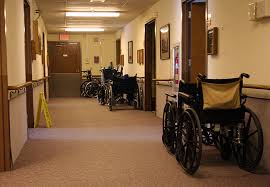Life isn’t always what we want it to be. No one knows that better than those in the final seasons of life.
 Recently my mother has shown unhappiness with the retirement home where she lives. Oh, nothing wrong with the home. They have good meals, the place is lovely, and the staff is attentive. But it’s not where she wants to be. If you ask her if she likes it there, she responds with a resounding “No.” Embarrassed at her own bluntness in front of visitors and potential residents, she apologized to the administration. They understood.
Recently my mother has shown unhappiness with the retirement home where she lives. Oh, nothing wrong with the home. They have good meals, the place is lovely, and the staff is attentive. But it’s not where she wants to be. If you ask her if she likes it there, she responds with a resounding “No.” Embarrassed at her own bluntness in front of visitors and potential residents, she apologized to the administration. They understood.
I didn’t. Not until I faced my own crisis of dependency.
For the second time in five months, I tripped over some rough pavement. This time, a large crack in the sidewalk sent me flying. Eager to protect my weak left ankle, I pivoted my body to the right, crash landing on my elbow. Amazing what thoughts can go through your head in a nano-second. The pain from the ensuing deep scrape was excruciating. After four days, my husband and I both humbly admitted that I was in no shape to be fixing meals.
On a tight schedule before he had to be to the office, he took me for breakfast to the only diner open in our small town. We had experienced small disappointments before but this time, the lapses piled higher than a stack of pancakes. When the glowering waitress brought eggs Jack had ordered that she had forgot, they were overdone. My omelet was brown, dry and so salty, I wouldn’t need water for the rest of the day. When we checked whether we were being charged for my hash browns she also forgot, she snapped, “Why didn’t you say something?”
As I pouted over my less than perfect brakfast, I muttered to my husband, “I could cook better than this.” Then reality gave me a bigger jolt than a cup of Starbucks Frappuccino. No. On that day, in that moment, I couldn’t. I couldn’t cook at all. My only option was to put up with sub-standard food and sub-gracious service. I couldn’t have things the way I wanted them.
A random thought crash landed inside my brain. This is what my mother faces every day.
If you ask most older people in care facilities whether they want to be there, they will probably tell you, no, they don’t want to be there. No one likes it. With good reason.
When a person has to make the hard decision (or the family makes it for them) to enter even an independent living retirement facility, they will experience:
-
Loss of privacy.
-
Loss of responsibility: We all need to be needed
-
Loss of independence: I have to wait for someone to help me with the most basic of needs.
-
Loss of choice: Meals are at set times; if I’m not there, I don’t eat.
-
Loss of purpose: there’s no reason to get up in the morning
-
Loss of cherished possessions
-
Loss of individuality: The care facility is based on the needs of the community, not the desires of the individual.
No wonder one study found that 29-52% of people in nursing homes suffer from depression!
My mother described it this way: “I look through my window at a world I can no longer participate in.” Even the nicest of facilities can feel like a gilded cage.
The best they can do is learn to accept this season of life, accept what they have learned throughout life—that we don’t always get what we want. Their head knows it. But the heart swings like a pendulum. They cope the best they can. Some do it better than others. Some days are better than others. All wish they could just go home.
How do I extend the grace of Christ to my aging family and friends? How can you?
Let them know you understand. Show compassion. Forget the arguments and the denials. It does stink to lose control. None of us would like it.
Remind them that this is temporary. For the Christian, we have the ultimate freedom of Heaven waiting for us. Help your elderly loved one to remember what they do still have. Don’t hesitate to remind their failing memories often of the blessings they have, yet do it in a non-argumentative way.
 Encourage positive friendships and social interaction. Steer them toward other residents who do take life more in stride. Find someone like my friend Bernice who at age 90, checked herself into a nursing home, saying. “I’ve spent 90 years taking care of others. Now it’s someone else’s turn to take care of me.” Okay, maybe a little self focused, but I admire her spunk. My grandfather also checked himself and my grandmother into a retirement center. He wanted to make the decision on his own so the family wouldn’t be burdened in making it for him. Great-Grandma Frank actually blossomed during her stay at a nursing home. We never realized how lonely she had become.
Encourage positive friendships and social interaction. Steer them toward other residents who do take life more in stride. Find someone like my friend Bernice who at age 90, checked herself into a nursing home, saying. “I’ve spent 90 years taking care of others. Now it’s someone else’s turn to take care of me.” Okay, maybe a little self focused, but I admire her spunk. My grandfather also checked himself and my grandmother into a retirement center. He wanted to make the decision on his own so the family wouldn’t be burdened in making it for him. Great-Grandma Frank actually blossomed during her stay at a nursing home. We never realized how lonely she had become.
Connect them with the world. Yes, my mother has more choice than she realizes. She doesn’t have to stay behind that window. But sometimes the exertion of asking isn’t worth the effort. Be proactive in taking your elderly friend away from the care facility. Be like my cousin Rhonda. Take the risk of going places. What’s the worst thing that could happen? Death? They would die enjoying life. Just remember – everything will take five times as long. Your focus is on them, not on your time schedule.
If this isn’t possible, bring the world to them either through visits, phone calls, happy day cards with smiley face balloons or confetti tucked inside, flowers, a knitted throw for their arm chair or any other way to fill their lives with beauty and interest. Get a friend to bring her infant child. Sneak a kitten into their room.
Redirect the conversation. Some venting is good and understandable. Too much is unhealthy for everyone. Instead of chiding your older friend, proactively steer the conversation toward happier topics. Describe the world outside, whether it’s the flowers you just planted, the ladies’ tea you attended at your church, the antics of your children or the latest political news. My mother really perks up when I ask her advice about small things like what kind of brush I should use on my dog (Momused to raise German Shepherds and teach dog training classes) or what she thinks of a recipe I want to try.
Remember that at the core of our elderly loved one’s complaints is that longing to go on to their heavenly home. (Check out Romans 8:20-23.) Use their dissatisfaction as an opportunity to remind them of what they have waiting for them. Yes, those conversations are hard. We don’t like to think about the end. Yet my husband and I have found that those conversations are some of the beautiful moments we have ever experienced. What a privilege to help a loved one prepare for the final phase of life’s journey and to share that hope in our eternal home that we both have!
Keep in mind who they really are. It’s easy to see our care facility friends only as dementia struck old people. Another part of us longs for the vibrant person they used to be. The truth is somewhere in the middle. They are still people, facing the hardest section of life and longing to be free. Life is in the process of limiting their options. Jesus wants to use us to lift their weary arms to endure the days ahead and show His mercy and love by letting them know they are not forgotten.
Share this passage with an older someone you love:

Thanks for this Karen. Mother, while dealing with her own ups and downs, sees the needs of others around her. She notices how many people are using walkers and oxygen tanks, etc. But she still does not want to succumb to using a walker herself. She does not want to acknowledge that she is old. Everyone there is older than she is. She thinks she has never had to deal with limitations before and this is difficult. She has never had to deal with illness or disease before, she thinks. She wishes someone would have prepared her for this stage in life even though she cared for her father through his last stage of life. Will we forget this lesson when we arrive at our last season on this earth? Even though she muses over these things she has times of positive purpose and looking beyond herself. She humbly acknowledges that she shows kindness to others and appreciation for what others do for her. The staff loves her because she is funny (we didn’t know that) and affirming to people in what they do. So many people complain about the facility and sometimes that is all the staff hears. Her ability to show kindness to others and be thankful comes from her Christian foundation. God has built her up and wired her to be this way; It’s her gift. But while this is going on she has periods of doubt which are stronger when she is tired or at the end of a long day. She is the most frustrated with the way her brain is or isn’t working. She has trouble completing tasks. “I don’t like this, why is this hard for me.” She has all kinds of ideas but has a hard time getting around to executing them, maybe because they are the things she struggles with doing. She has been a life long perfectionist and now she can’t ace the test.
Other residents think she is lucky because she has family that comes to visit and take her out or stay in and do things with her. No matter what age people are they need a connection, a relationship with others. Social activities are provided but one size does not fit all. Some people do better with a one to one approach verses large group activities. Some people sit in the dining room all by themselves and look so lonely even though they are in a room of almost a hundred people. No matter what their personality people need a special connection, individualized which can enrich their lives in this season of life. A staff of caregivers that truly love working with the elderly can make a big difference. Families and volunteers that commit to building relationships is just icing on the cake. How would you like to be transplanted from New York out to the southwest where everything is foreign? It’s tough, tough choices. How can we make better choices?